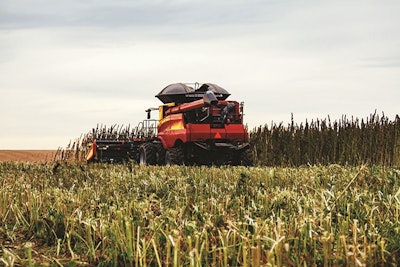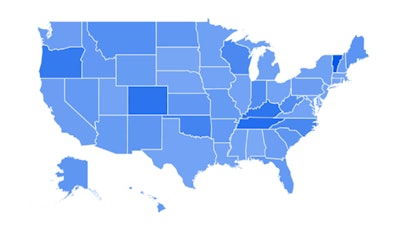
Throughout 2018, hemp legalization has remained a steady backdrop in the Farm Bill debate. U.S. Sen. Mitch McConnell added his Hemp Farming Act into the $867-billion agricultural overhaul back in June; since then, the hemp revolution has been on the tip of farmers’ tongues from Kentucky to California.
Along the way, interest in what will happen after passage of the Farm Bill has only grown. When Congress approved the legislation on Dec. 12, the country collectively looked ahead to a time when the hemp-derived CBD market will flourish—to the tune of $22 billion by 2022, according to recent Brightfield Group projections.
Wanting to get a sense of how that interest is playing out in the U.S., we turned to Google.
Melena Guganus published a report on CBD-related search trends for Remedy Review. She found that Oklahoma, Kentucky and Indiana led the country in digital queries for CBD-related terms. Those traditionally conservative states each have an agricultural legacy; all three developed hemp cultivation “pilot programs” under the auspices of the 2014 Farm Bill, which allowed states to oversee hemp programs for industrial and commercial purposes.
Now that President Trump has signed the 2018 Farm Bill into law, thus legalizing hemp in the U.S., we wanted to get a sense of how farmers and the general public were looking into the matter.

Here are the top 10 states that have shown an interest in “hemp,” according to Google; all 10 of these states’ legislatures enacted a hemp cultivation pilot program in 2016 (except Wisconsin, which approved its program in 2017).
- Vermont
- Tennessee
- Kentucky
- Colorado
- Wisconsin
- Oregon
- Montana
- North Carolina
- Maine
- Hawaii
Search counts surged in mid-December, as the full bill hit the floor of the U.S. Congress and quickly received approval votes.
For the search term “hemp farm bill,” the data points change a bit. Several of these states have not yet entered the hemp market at all, signaling a growing interest from players still on the sidelines.
- Hawaii
- South Dakota (no hemp pilot program currently)
- Iowa (no hemp pilot program currently)
- Colorado
- Washington D.C. (no hemp pilot program currently)
- Mississippi (no hemp pilot program currently)
- Nebraska
- Oregon
- Alabama
- Michigan
Under the 2018 Farm Bill, states will continue to be the primary regulators for hemp production and distribution—although not without the direct approval of the USDA. With lower barriers to entry, the remaining 10 states that have not yet developed a pilot program may be more likely to broach the market. The plant will be taken off the federal list of controlled substances, after all, and sales will become legal across the country. (The definition of the hemp plant remaining inextricably tied to that 0.3-percent THC limit, imposed by previous policy and case law.) Hemp cultivators and researchers will now be able to apply for federal grants and specific crop insurance policies, opening the door to greater access to capital.
“With the Farm Bill of 2018 …, the restrictions around growing industrial hemp could be lifted by the end of the year,” Ari Sherman, president of Evo Hemp, told Cannabis Business Times upon passage of the bill. “This bill will also help clarify that resin products derived from hemp, like cannabinoids, will be legal on a federal level. Many people will benefit from this bill, including farmers, manufactures, retailers and consumers. Small family farmers will be able to make a sufficient amount of income off a small amount of land. This bill will open up advertising opportunities for hemp product manufactures. Retailers will be given more freedom in the variety of hemp products that they carry. Last, consumers will be given access to all domestically grown hemp-based products.”


























